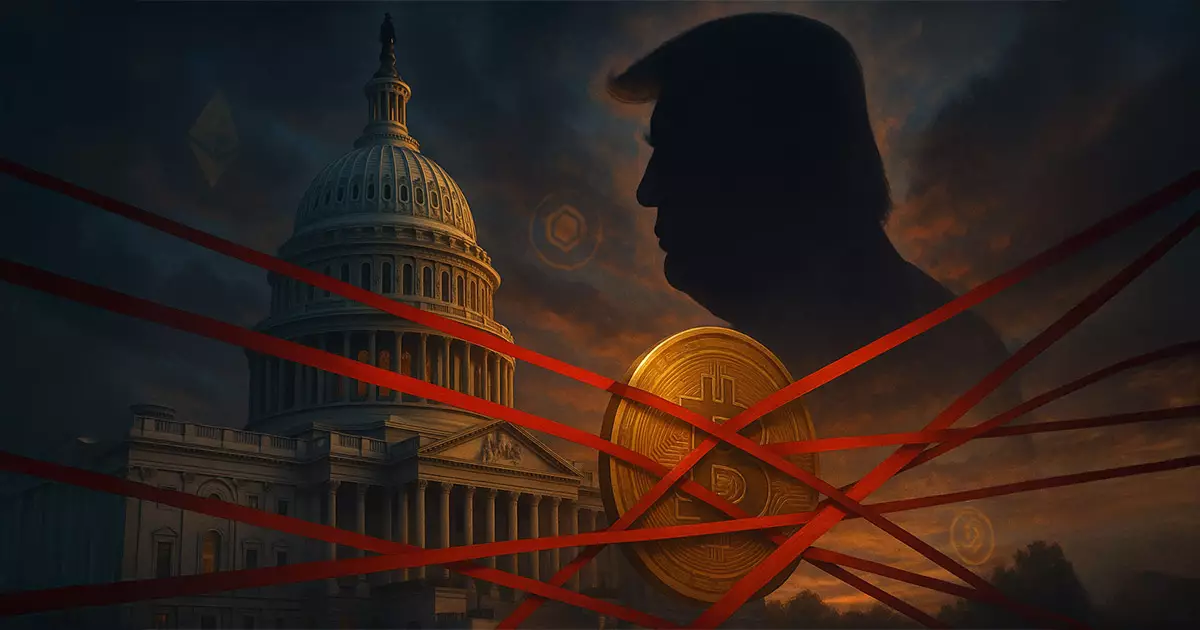The discussions surrounding former U.S. President Donald Trump’s ventures into the world of cryptocurrency have illuminated profound ethical concerns that extend beyond the typical political squabbles. In the last week, the specter of Trump’s financial pursuits has raised unsettling questions about the integrity of crypto legislation, particularly the Guiding and Establishing National Innovation for U.S. Stablecoins (GENIUS) Act. This proposed regulatory framework aims to formalize the landscape of stablecoins but finds itself mired in apprehensions about conflict of interest. Center-right wing liberalism advocates for responsible and transparent governance, yet in Trump’s case, the merger of personal profit motives with public policy appears most troubling.
Ryan Gilbert, founder of the fintech venture capital fund Launchpad Capital, poignantly illustrated the frustration many feel: “It’s unfortunate that personal business is getting in the way of good policy.” Such sentiments echo throughout political circles, as officials from both sides of the aisle grapple with the implications of Trump’s financial entanglements. The reality is brutally clear; as long as Trump’s financial interests are intertwined with policymaking, legislative progress will be stymied. Simplistic arguments suggesting political impasse often ignore the deeper implications of a leader prioritizing personal wealth over public good.
The Genesis of Chaos: Trump’s Memecoin Maneuverings
The origins of this currency chaos can be traced back to Trump himself. Launching the $TRUMP memecoin just days prior to his presidential inauguration, he not only made waves but redefined the intersection of politics and digital finance. While it initially surged to a staggering $75, the rapid decline post-inauguration led many small investors to lose over $2 billion—a catastrophic outcome for the everyday American. The misfortune of those investors raises an essential ethical question; does Trump’s entrenchment in crypto serve the populace, or is it simply a facade masking a wealth seizure at the expense of unsuspecting citizens?
As Trump-linked firms pocketed approximately $100 million in trading fees shortly after the memecoin’s launch, the associated risks came to the forefront. Such phenomena call into question the essence of accountability within political frameworks. The systematic erosion of trust suggests a distressing reality—when personal gain supersedes civic responsibility, the very foundation of democratic governance begins to crumble.
Regulatory Gridlock: The Protectors or Perpetrators?
The recent maneuverings around the GENIUS Act have unveiled a regulatory gridlock that hints at deeper political divides. The failed Senate vote, which ended with a barely-there majority of 48-49, was not a mere procedural issue; it symbolizes a broader reluctance to confront mistrust and influence within the system. Over the weekend, a faction of Senate Democrats voiced outrage at the bill’s progress, with some asserting that without comprehensive revisions addressing national security and money laundering, they would withdraw their support. Hence, we are forced to question if legislative improvement is a genuine aspiration or merely a casualty of political maneuvering.
Notably, the framing of criticisms regarding Trump’s financial influx from crypto reflects a distinct political posture. Democratic leaders like Congresswoman Maxine Waters have portrayed his actions as an egregious “corruption in broad daylight.” But this begs the question—why is financial gain from a sector like crypto inherently corrupt when it may also reflect broader market trends? The truth lies perhaps not in whether crypto is corrupt but rather in how its interactions with governance structures reveal vulnerabilities that political figures exploit for personal enrichment.
Shocking Revelations: Turning Politics into Profits
Beyond the broader implications of crypto regulation, particulars surrounding Trump’s familial ties to the industry raise serious red flags. Reports of insider trading activities and profits tied to his family’s dealings, such as the near $100 million earned during the launch of Melania Trump’s memecoin, further illustrate the opacity and dubious ethics surrounding their ventures. Senator Mark Kelly’s introduction of the End Crypto Corruption Act shows that legislators recognize the urgent need to delineate personal and professional boundaries in governance, particularly when individuals of influence notoriously blend the two.
It’s one thing to consider a businessman leveraging opportunity; it’s quite another to observe a former president purportedly profiting from his tenure in a way that distorts financial markets and public funds. Senator Jeff Merkley encapsulates this dilemma well—“Currently, people who wish to cultivate influence with the president can enrich him personally.” This raises profound accountability questions; how far can power be wielded for personal gain?
In the face of these alarming revelations, the tempo of negotiations for the GENIUS Act suggests that bipartisan efforts are attempting to counterbalance the distortions introduced into the political landscape by Trump’s crypto empire. Yet, as both sides inch closer towards legislative consensus, the question remains: will they prioritize the public good, or will Trump’s financial interests persist as an insatiable shadow over governance? As concerns about corruption and influence peddling grip the public discourse, a profound reckoning with power dynamics in American politics is needed now more than ever.
















Leave a Reply